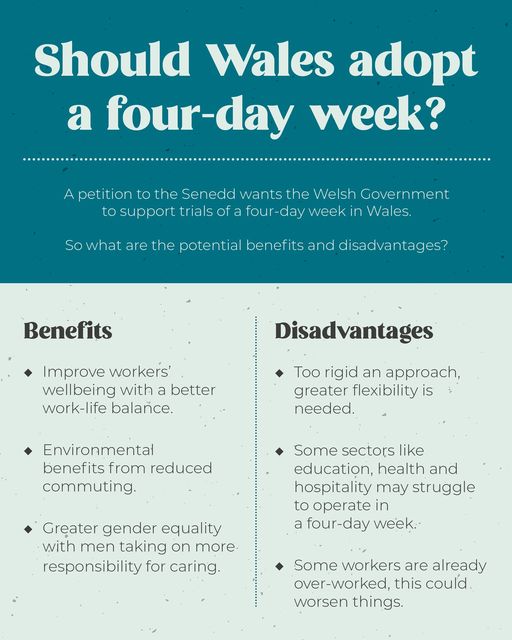Should Wales adopt a four day working week? A Senedd Committee calls on Welsh Government to launch trial

A Welsh parliament committee has called for the launch of a four-day working week trial in Wales.
The Senedd’s Petitions Committee, chaired by Alyn and Deeside MS Jack Sargeant (Lab), is urging the Welsh government to conduct pilots in the public sector, where employees would work four-day weeks for the same wages.
He said: “A four-day week is a bold proposal aimed at giving people back time to train and upskill, to navigate huge changes in the workplace without placing more stress on workers and to give people time back in a country that works some of the longest hours in Europe.”
The Petitions Committee report suggests that reducing the traditional five-day workweek to four days could lead to increased productivity and improved quality of life for workers.
The report argues that the COVID-19 pandemic has forced many to reconsider their priorities and the increasing use of automation is also a driving force for change in the way we work.
The report calls for the Welsh government to add to the growing evidence base on the four-day week and to conduct its own experiments in the public sector.
While the committee has not reached a cross-party consensus, a majority of members endorse the recommendations and view the idea of a four-day week positively.
The trial, if launched, would be a significant step towards finding a new balance in the way we work and could lead to a more productive and equal society.
According to a report by Think Tank Autonomy, 62% of the Welsh public would ideally choose to work a four-day week or less.
Additionally, 57% of the Welsh public would support the Welsh Government piloting a scheme to move towards a four-day working week, and 76% would support the sharing out of work so that people can have a good work-life balance.
The committee recognised that there are some parts of the public sector where it is less easy to implement a shorter working week and suggests that a pilot should prioritise those parts of the devolved public sector where hours could be reduced without organisations needing to recruit a considerable number of additional staff.
They also suggest that the workforce and its representatives need to be involved throughout to ensure that the pilot has buy-in from them and that practical barriers to implementing reduced working hours are addressed.
Supporters of a four-day working week argue that a shorter workweek would improve workers’ well-being by providing better work-life balance, improving mental and physical health, and raising job satisfaction.
They also cite evidence from Iceland, Japan, and New Zealand that suggests a four-day week can boost productivity.
Additionally, they argue that a four-day week would have environmental benefits, such as reduced air pollution and lower carbon emissions due to reduced commuting and behavioral change, and contribute to greater gender equality.

However, opponents of a four-day week have raised concerns about potential negative impacts.
They argue that a four-day week is too rigid an approach when greater flexibility is required in the workplace.
They also point out that some sectors, such as education, health, hospitality, and personal services, may struggle to replicate their productivity or operate within a four-day week.
Additionally, they argue that some workers are already overworked, and moving to a four-day week would exacerbate the stress-related challenges they face. Finally, some organisations suggest that moving to a four-day week poses organisational challenges and may be too complicated to implement.
Social entrepreneur Mark Hooper submitted the petition to the committee calling for trials to be launched, he introduced a four-day week at Indycube which provides a network of remote co-working spaces.
He said: “Our lives are too often dominated by how we earn our living and that makes us more ill, sadder and ultimately less productive.”
Conservative South Wales Central MS Joel James voiced opposition to the four-day week proposal, he said: “The evidence does not provide adequate justification to spend Welsh Government budget, intended for the people of Wales, on a scheme that the Welsh Government does not have the legislative competence to implement across the board.”
“The arguments for the four-day working week are not supported by sufficient research data on improving productivity, which the whole premise of justifying a four-day working week rests upon.” He said: “I am fundamentally opposed to a four-day working week, as set out in this petition.”










